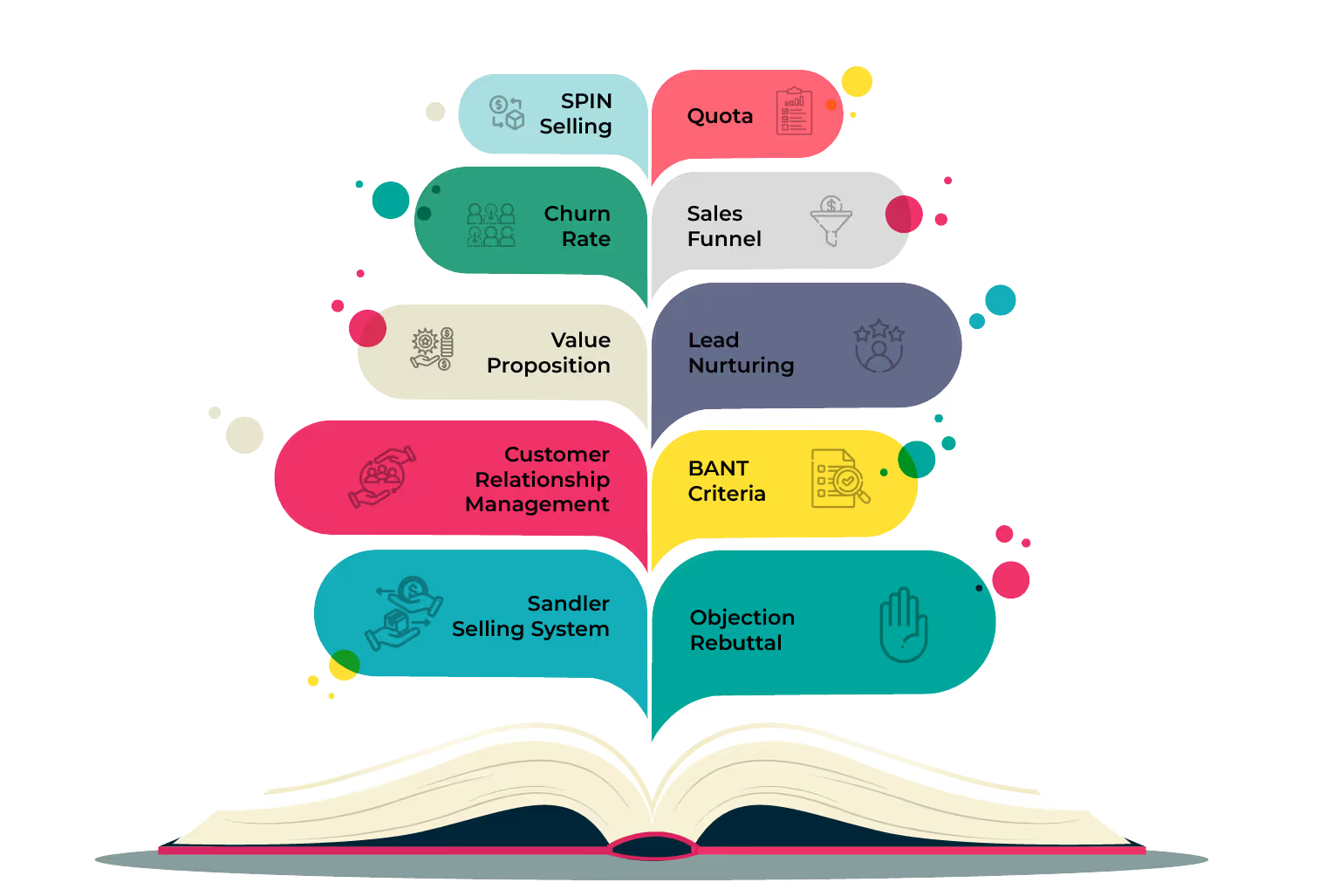
Blog
What Is the Essential Guide to Understanding Sales Terminology?
January 17, 2024


Key Insights
People say jargon is a bad thing, but it's really a shortcut vocabulary professionals use to understand one another. - Erin McKean
Knowing the terms, terminologies, and jargon in your industry is an advantage. It helps you stand out from the crowd, helps you convey ideas with clarity, and makes people listen to you with attention.
Especially in sales, where a great deal is dependent on language and communication, your sales reps must be aware of the basic sales terms, sales acronyms and the specialized jargon.
In this article, we will walk you through sales terminologies, the ones used in everyday sales conversations, and the specialized examples that are to be known during departmental discussions.
So scroll down for more.
What are sales terminologies?
Sales terminologies, which include essential sales abbreviations, form the specialized vocabulary and expressions utilized in the field of sales and marketing. These abbreviations, serving as succinct representations, are commonly employed to articulate various aspects of the sales process, customer interactions, and performance metrics.
Understanding these sales terminologies is essential for sales professionals to effectively communicate, strategize, and navigate the complexities of the sales process.
Examples of common sales terminologies

In sales, there are recurring sales terms that everyone involved in sales and related to sales must be familiar with. It's like having a common language for a team – think of sales management definition as the shared understanding that brings clarity and cohesion to the sales process, making collaboration more effective.
So here are a few terms in sales examples that will help you maneuver through your everyday operations. Utilizing a net sales calculator is also helpful for evaluating profit margins and determining the most profitable sales channels.
Prospect: A potential customer or client who has shown interest in a product or service but has not yet made a purchase.
Pitch: A concise and persuasive presentation of a product or service to a potential customer, highlighting its features and benefits.
Closing: The final step in the sales process where the salesperson seeks to secure a commitment from the prospect to make a purchase.
Upselling: The practice of encouraging a customer to buy a higher-priced or additional product or service than originally intended.
Pipeline: The sales pipeline refers to the stages that a potential customer goes through, from initial contact to closing the deal.
Cold Calling: The act of making unsolicited calls to potential customers in an attempt to generate interest and make a sale.
Qualifying: The process of determining whether a prospect has the potential to become a valuable customer based on their needs, budget, and other criteria.
Objection Handling: Addressing and overcoming concerns or hesitations that a prospect may have about making a purchase.
Follow-up: The act of contacting a prospect after the initial interaction to nurture the relationship, provide additional information, or move the sales process forward.
Commission: A percentage of the sale price that a salesperson earns as compensation for making a sale.
For further reading, check What Are the Essential Components of a Successful Sales Meeting Agenda?
Examples of specialized sales terminologies

Knowing the basic sales terminologies is not enough for a salesperson, sales manager, or sales executive. They must delve into the nitty-gritty terms in sales to enhance their sales knowledge and responsibilities, embracing a comprehensive understanding of the intricate sales concepts crucial for success in the dynamic business landscape.
So let's look at a few of these sales terminologies and jargon that a salesperson must know.
SPIN Selling: A sales technique that focuses on Situation, Problem, Implication, and Need-Payoff questions to better understand customer needs and tailor the sales approach accordingly.
BANT Criteria: A qualification framework that stands for Budget, Authority, Need, and Timeline, used to assess the readiness of a prospect to make a purchase.
Churn Rate: The percentage of customers who stop using a product or service within a given period, often used in subscription-based sales models.
Sales Funnel: The visual representation of the stages a prospect goes through in the sales process, from initial contact to closing the deal.
Customer Relationship Management: Software or systems used to manage and analyze customer interactions, data, and relationships throughout the sales cycle.
Quota: A sales target or goal set for a specific period, typically in terms of revenue, units sold, or other key performance indicators.
Value Proposition: A clear statement that explains how a product or service solves a customer's problem, delivers benefits, and distinguishes itself from the competition.
Sandler Selling System: A sales methodology that emphasizes a mutual, collaborative approach between the buyer and seller, focusing on uncovering the prospect's pain points and addressing them.
Objection Rebuttal: Strategies and responses used by salespeople to counter and overcome objections raised by prospects during the sales process.
Lead Nurturing: The process of building and maintaining relationships with potential customers over time, often through targeted communication and content, to convert them into actual customers.
P.S: Here is one more extra term to enhance your sales knowledge. Win Rate. Win rate examines the percentage of opportunities or deals won compared to the total number of opportunities pursued.
Check your winning percentage calculator with Kennect.
For further reading, check How to Master Sales Abbreviations: A Comprehensive Guide for Sales Professionals.
Final Thought
Knowing the terms and jargon of your industry is always an advantage.
In addition to knowing these sales terminologies, it is also important to know when and how to use them.
For example: as a sales rep you must be judicious in your use of words. When meeting a potential client it is always ideal to limit yourself to the simple words in your vocabulary. This ensures that whatever you intend to convey is effectively communicated. In addition, it will not leave the listener feeling less knowledgeable or ignorant in the discussion.
Carefully articulating your sentences with a wide sales vocabulary also helps you to deliver your ideas to your peers and to be viewed as a knowledgeable person in your industry.
Being recognized as a thought leader in your industry is a significant milestone in career advancement.
Hence, enhancing your knowledge of sales terminology is always an added advantage for people in the sales industry.
To read more about these sales-related topics, connect with Kennect. For more information Book A Demo NOW!
ReKennect : Stay ahead of the curve!
Subscribe to our bi-weekly newsletter packed with latest trends and insights on incentives.
Thank you! Your submission has been received!
Oops! Something went wrong while submitting the form.
Your data is in safe hands. Check out our Privacy policy for more info















